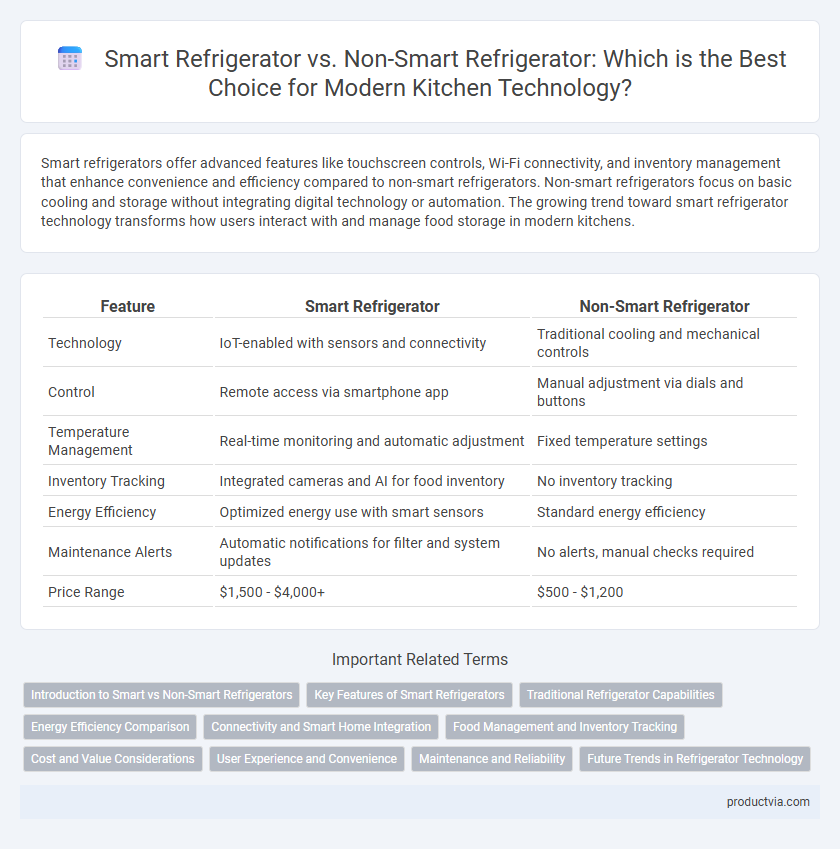Smart refrigerators offer advanced features like touchscreen controls, Wi-Fi connectivity, and inventory management that enhance convenience and efficiency compared to non-smart refrigerators. Non-smart refrigerators focus on basic cooling and storage without integrating digital technology or automation. The growing trend toward smart refrigerator technology transforms how users interact with and manage food storage in modern kitchens.
Table of Comparison
| Feature | Smart Refrigerator | Non-Smart Refrigerator |
|---|---|---|
| Technology | IoT-enabled with sensors and connectivity | Traditional cooling and mechanical controls |
| Control | Remote access via smartphone app | Manual adjustment via dials and buttons |
| Temperature Management | Real-time monitoring and automatic adjustment | Fixed temperature settings |
| Inventory Tracking | Integrated cameras and AI for food inventory | No inventory tracking |
| Energy Efficiency | Optimized energy use with smart sensors | Standard energy efficiency |
| Maintenance Alerts | Automatic notifications for filter and system updates | No alerts, manual checks required |
| Price Range | $1,500 - $4,000+ | $500 - $1,200 |
Introduction to Smart vs Non-Smart Refrigerators
Smart refrigerators incorporate advanced technology such as touchscreens, Wi-Fi connectivity, and internal cameras, enabling remote monitoring and inventory management through mobile apps. Non-smart refrigerators rely solely on traditional cooling mechanisms without interactive features or internet integration. The evolution from non-smart to smart refrigerators reflects growing consumer demand for convenience, energy efficiency, and seamless kitchen appliance connectivity.
Key Features of Smart Refrigerators
Smart refrigerators feature advanced technologies such as touchscreen interfaces, Wi-Fi connectivity, and integrated cameras that allow users to monitor contents remotely and create shopping lists automatically. They include sensors for temperature control and energy efficiency, ensuring optimal food preservation and reduced power consumption. Unlike non-smart refrigerators, smart models offer seamless integration with smart home ecosystems and voice assistant compatibility for enhanced convenience and user interaction.
Traditional Refrigerator Capabilities
Traditional refrigerators offer reliable cooling and preservation features focused on temperature control and energy efficiency without connectivity options. These non-smart units utilize mechanical thermostats and compressor technology to maintain consistent freshness for food storage. Basic models lack advanced functions like remote monitoring or automated inventory management found in smart refrigerators.
Energy Efficiency Comparison
Smart refrigerators utilize advanced sensors and connectivity features to optimize cooling cycles, significantly reducing energy consumption compared to non-smart models. Energy-efficient compressors and adaptive defrost systems in smart refrigerators adjust operation based on usage patterns, leading to lower electricity bills and environmental impact. In contrast, non-smart refrigerators often run on fixed cycles, resulting in higher energy use and less precise temperature control.
Connectivity and Smart Home Integration
Smart refrigerators offer advanced connectivity features, enabling seamless integration with smart home ecosystems via Wi-Fi or Bluetooth, allowing remote monitoring and control through mobile apps. Non-smart refrigerators lack such connectivity, limiting user interaction to manual control and physical interfaces. This integration enhances convenience, energy management, and appliance automation within modern smart homes.
Food Management and Inventory Tracking
Smart refrigerators use advanced sensors and AI to monitor food inventory, track expiration dates, and suggest recipes based on available ingredients, greatly enhancing food management efficiency. Non-smart refrigerators lack these integrated technologies and rely solely on manual inventory checks and user memory, increasing the risk of food waste and expired items. The evolving refrigerator technology clearly favors smart models for optimized food tracking and reduced household food spoilage.
Cost and Value Considerations
Smart refrigerators typically feature advanced technology such as Wi-Fi connectivity, touchscreens, and inventory management systems, resulting in higher upfront costs compared to non-smart refrigerators. Non-smart refrigerators offer reliable cooling performance at a lower price point, making them more accessible for budget-conscious consumers seeking basic functionality. Evaluating the value of a smart refrigerator depends on the consumer's priorities for convenience and energy efficiency versus the cost savings associated with traditional models.
User Experience and Convenience
Smart refrigerators enhance user experience by integrating features such as touchscreen controls, inventory tracking, and remote access via smartphone apps, enabling seamless meal planning and energy management. Non-smart refrigerators provide basic cooling functions without connectivity, requiring manual adjustments and lacking real-time notifications for maintenance or supply status. The convenience of smart refrigerators lies in their ability to automate routine tasks and deliver personalized settings, significantly improving kitchen efficiency compared to traditional models.
Maintenance and Reliability
Smart refrigerators offer advanced self-diagnostic features that simplify maintenance by alerting users to potential issues before they become critical, enhancing overall reliability. Non-smart refrigerators rely on manual inspections and often require professional service for troubleshooting, which can delay repairs and increase downtime. Continuous software updates in smart models improve performance and longevity, making them more reliable over time compared to conventional models.
Future Trends in Refrigerator Technology
Smart refrigerators integrate advanced IoT connectivity, AI-driven inventory management, and energy-efficient features, paving the way for personalized user experiences and reduced food waste. Non-smart refrigerators rely on traditional cooling technology without adaptive capabilities, limiting their potential in future smart home ecosystems. Emerging trends emphasize AI integration, voice control, and seamless appliance interoperability, making smart refrigerators the centerpiece of modern kitchen innovation.
Smart Refrigerator vs Non-Smart Refrigerator for Refrigerator Technology Infographic

 productvia.com
productvia.com